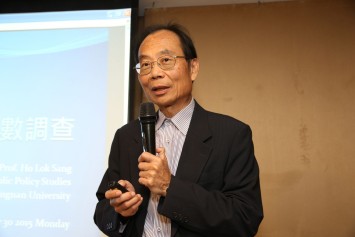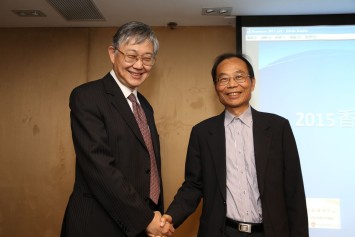Lingnan University survey reveals that Happiness Index for Hong Kong people drops slightly and satisfaction with public policy remains unchanged
According to the results of the Hong Kong Happiness Index Survey conducted by Lingnan University’s Centre for Public Policy Studies, the Happiness Index for Hong Kong people in 2015 stands at 70.0 (on a scale of 0 to 100), which is slightly lower than last year’s 70.5. Surprisingly, the Happiness Index of people aged below 30 rose from 67.8 to 69.3.
Respondents’ degree of satisfaction with the media rose slightly to 4.89 from last year’s 4.76, albeit still at a low level. Satisfaction with Hong Kong’s public policy is 4.37 (on a scale of 0 to 10), with not much difference from last year’s 4.34. Satisfaction with the living environment dropped noticeably to 5.69 from last year’s 5.95, while that with public healthcare decreased to 6.30 from last year’s 6.49. A rating at 6 or above can be considered as good or better.
The Happiness Index of those with a monthly household income between $10,000 and $20,000 showed a significant rise of 7% from last year’s level to 6.82, while those with income below $10,000 rose by 3%. These increments probably reflect the increase in the statutory minimum wage rate earlier this year. The Happiness Index of those with family income from $20,000 to $30,000 fell by 4.7%.
Long working hours and work stress undermine happiness
Statistics from past years revealed that people with longer working hours are generally less happy. Those who work for over 60 hours a week reported a happiness rating at 6.56, which is noticeably lower than the average Happiness Index of 7.00 for all Hong Kong people. Work pressure, long working hours and financial burdens are the main contributing factors of Hong Kong people’s unhappiness. This year 35.7% of the respondents have to work over 50 hours a week, showing a slight increase from 33.4% of last year, but is still significantly lower than 2013’s proportion of over 40%.
Similar to past surveys, female are generally happier than male respondents, and older people also reported higher Happiness Index levels. Housewives and retired persons are happier than full time working respondents and students. The Happiness Index of the unemployed showed a significant increase by 0.33 to 6.64 this year, but they remained the least happy group.
Engagement of youngsters increased
Since 2008, the annual scheme has surveyed on the factors of Love, Insight, Fortitude and Engagement (LIFE) which are related to the mental quality of respondents. The score on Love this year fell slightly to 8.02 from last year’s 8.17; the score on Insight dropped slightly by 0.05 to 7.17; the score on Fortitude decreased by 0.25 to 7.37; and the score on Engagement increased from 7.33 to 7.47. The Engagement score of youngsters (aged 21 - 29) showed a significant increase of 0.35 to 6.93. This encouraging change is unfortunately counterbalanced by the lowest Fortitude score of 6.75 ever reported. Also worth mentioning is the fact that elderly people have reported a continuous rise in the Engagement Index, from 6.66 in 2011 all the way to this year’s 7.69. The Engagement score reflects purposive living.
- End -
About the Hong Kong Happiness Index Survey
Conducted annually with the help of the Public Governance Programme and designed by the Centre for Public Policy Studies of Lingnan University since 2005, the Hong Kong Happiness Index Survey tracked and measured the level of happiness of Hong Kong residents on a scale of 0 to 100. For specific groups the scale is from 0 to 10. Since 2008, the Survey also includes questions on Love, Insight, Fortitude and Engagement, which are the key elements of “mental capital” essential to happiness.
The Hong Kong Happiness Index Survey in 2015 marks the eleventh consecutive year the survey has been conducted. Telephone interviews with a total of 913 respondents aged above 21 selected by random sampling were conducted from 30 September to 6 October 2015, with a response rate of 24.7%. This annual survey is sponsored by the Shih Wing Ching Foundation. The Centre for Public Policy Studies would like to express its gratitude for the Foundation’s continuous support.
About the Centre for Public Policy Studies of Lingnan University
The Centre for Public Policy Studies of Lingnan University was established in 1994. Apart from self-initiated studies, the Centre offers support for public policy research among Lingnan’s researchers and conducts commissioned studies on various aspects of public policy.
Please click here to download the full report of "Hong Kong Happiness Index Survey 2015".



